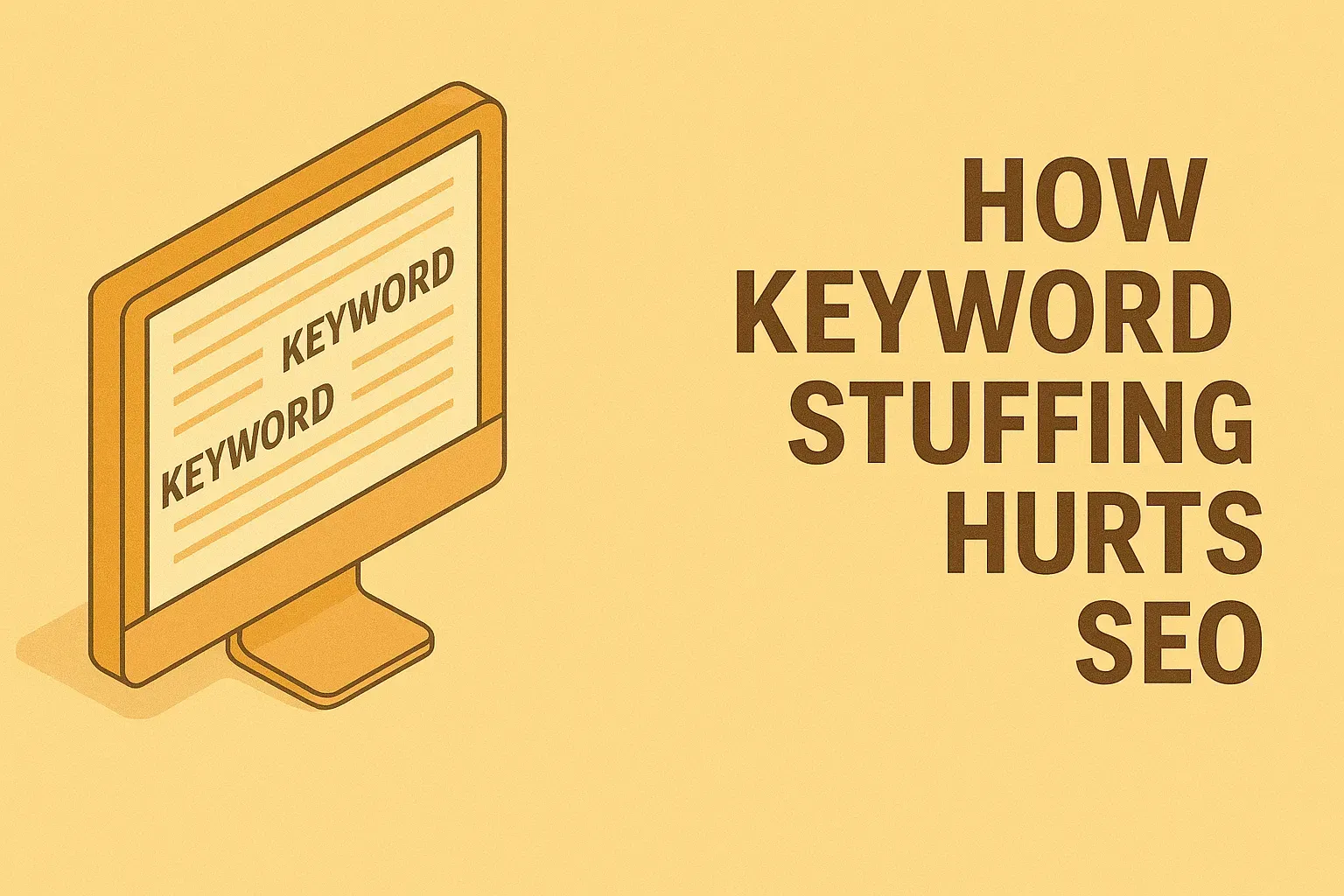How Keyword Stuffing Hurts SEO


In the fast-paced world of online marketing, search engine optimization (SEO) plays a crucial role in driving organic traffic to websites. However, there is a dangerous practice that many website owners and marketers engage in: keyword stuffing. This deceptive technique involves excessively cramming keywords into web content with the misguided belief that it will boost search rankings. In reality, It does more harm than good and can severely impact your website's SEO performance.
Once considered an effective SEO tactic, keyword stuffing has now become outdated and penalized. Search engines like Google have become increasingly sophisticated in recognizing and penalizing websites that employ such spammy techniques. Keyword stuffing not only compromises the user experience but also damages your website's credibility in the eyes of search engines. It's important to understand the negative consequences of keyword stuffing in order to develop a more sustainable and effective SEO strategy.
One of the primary reasons why it hurts SEO is its adverse impact on user experience. When keywords are unnaturally inserted into content, it disrupts the flow and readability, making the text appear forced and spammy. Visitors to your website expect valuable, informative content that is easy to read and understand. Keyword-stuffed content, on the other hand, comes across as shallow and untrustworthy, driving users away and increasing bounce rates. In today's user-centric digital landscape, user experience is paramount, and keyword stuffing undermines that crucial aspect.
Introduction to Keyword Stuffing

Keyword stuffing refers to the practice of unnaturally overloading web content with excessive keywords in an attempt to manipulate search engine rankings. In the past, search engines relied heavily on keyword density as a ranking factor. However, as search algorithms have evolved, they now prioritize content quality and user intent over keyword density. It violates search engine guidelines and can result in severe penalties, including loss of organic visibility and even removal from search engine results pages (SERPs).
It is essential to differentiate between legitimate keyword optimization and keyword stuffing. Proper keyword optimization involves strategic placement of relevant keywords within the content to enhance its relevance to specific search queries. On the other hand, keyword stuffing involves indiscriminate repetition of keywords, often in an unnatural manner, with the sole purpose of manipulating search engine rankings. This unethical practice not only compromises the integrity of your website but also damages its long-term SEO prospects.
Search engines have become more intelligent in identifying manipulative tactics, and keyword stuffing is a clear violation of their guidelines. Rather than rewarding websites that engage in this practice, search engines actively penalize them. The consequences of such penalties can be severe, resulting in significant drops in organic rankings, loss of organic traffic, and diminished online visibility.
The Negative Impact on User Experience
It disrupts the natural flow and readability of content, leading to a poor user experience. Users expect high-quality, informative content that addresses their needs and queries. When content is stuffed with keywords, it becomes difficult to read, understand, and connect with. This diminishes the trust and credibility users place on your website, ultimately driving them away. Negative user experience metrics, such as high bounce rates and low time on page, send strong signals to search engines, indicating that the content does not meet user expectations.
It can lead to keyword cannibalization, a situation where multiple pages on your website compete for the same keyword, causing confusion for both search engines and users. When search engines encounter multiple pages targeting the same keyword, they struggle to determine which page should rank higher, resulting in fragmented search visibility. Users, too, may find it challenging to navigate through your website if they encounter multiple pages with similar content but different keyword variations. This leads to a frustrating user experience, and users are more likely to abandon your website in favor of competitors' sites that provide clearer and more user-friendly content.
It can harm your website's credibility and brand reputation. Users are becoming more discerning and can easily spot content that appears spammy or manipulative. When they encounter keyword-stuffed content, they may perceive your website as untrustworthy and unreliable. Negative user experiences, such as encountering irrelevant or low-quality content, can have a long-lasting impact on how users perceive your brand, leading to a loss of credibility and potential business opportunities.
Effects on Search Engine Rankings

Search engines use complex algorithms to assess the relevance and quality of web content. Keyword stuffing directly violates these algorithms and can lead to a significant drop in search engine rankings. While the intention may be to improve visibility, search engines are quick to recognize this practice and apply penalties accordingly. These penalties may range from a temporary decrease in rankings to a complete removal from the search results, severely impacting your website's visibility and organic traffic.
It can also dilute the overall thematic relevance of your content. When keywords are excessively used, search engines may struggle to understand the main focus of your content, resulting in a loss of keyword relevance. This dilution of relevance can weaken the overall topical authority of your website, making it harder for search engines to recognize your expertise in a particular subject matter. As a result, your website may not rank as highly for the targeted keywords, leading to a missed opportunity to attract organic traffic and potential customers.
Search engines increasingly consider user engagement metrics as indicators of content quality. Keyword stuffing compromises the user experience, leading to higher bounce rates, lower time spent on page, and fewer conversions. These negative engagement signals send a message to search engines that the content fails to meet user expectations, prompting a decrease in rankings. By focusing on providing valuable, well-crafted content that resonates with users, you can improve user engagement metrics and enhance your website's visibility in search results.
The Penalties and Risks
Search engines take a strong stance against keyword stuffing and employ various measures to penalize websites that engage in this practice. Google, for instance, regularly updates its search algorithms, such as the Panda and Penguin updates, to identify and penalize manipulative tactics. When your website is flagged for keyword stuffing, you may face severe consequences, including manual penalties or algorithmic downgrades. These penalties can result in a significant loss of organic visibility, making it challenging for users to find your website through search engine queries.
In addition to the direct impact on search rankings, it can also harm your website's overall online presence. When your website is penalized, it may be difficult to recover and regain lost rankings and visibility. Reversing the effects of a penalty often requires a significant investment of time and resources in rectifying the keyword-stuffed content and rebuilding the trust and authority of your website. Furthermore, your brand's reputation may suffer as users and industry peers perceive your website as engaging in manipulative tactics.
Another risk is the potential loss of valuable backlinks and partnerships. Other website owners and influencers may hesitate to link to your content or collaborate with your brand when your website is penalized. This can limit your opportunities for off-page SEO, which relies heavily on building high-quality backlinks and establishing relationships within your industry. By avoiding this black hat strategy and focusing on providing valuable content, you can maintain a positive reputation and attract authoritative links from reputable sources.
Alternative SEO Strategies: Quality Content and Natural Keyword Usage
To mitigate the risks and negative impacts, it's crucial to adopt alternative SEO strategies that prioritize high-quality content and natural keyword usage. Search engines like Google have shifted their algorithms to prioritize user intent and content relevance over keyword density. By focusing on providing informative, engaging, and well-structured content, you can enhance the user experience, improve search engine visibility, and attract a wider audience.
One effective approach is to conduct comprehensive keyword research and analysis. This involves identifying relevant keywords and phrases that align with your target audience's search intent. Rather than obsessively inserting these keywords into your content, aim to incorporate them naturally and organically. Focus on creating comprehensive and authoritative content that addresses user queries, solves problems, and provides valuable insights. By incorporating keywords in headings, subheadings, and throughout the content, you can signal to search engines the relevance of your content without resorting to keyword stuffing.
Beyond keyword usage, prioritize other SEO elements, such as meta tags, alt text for images, and internal linking. Optimizing these aspects of your website allows search engines to understand your content better and improves the overall user experience. Additionally, invest in a user-friendly website design and navigation structure, ensuring that visitors can easily find the information they seek. By combining these elements with quality content and natural keyword usage, you can establish a strong foundation for sustainable SEO success.
Best Practices for Keyword Optimization
Keyword optimization is a fundamental aspect of SEO, but it must be approached with care and strategic intent. To avoid falling into the trap of keyword stuffing, follow these best practices for keyword optimization:
- Conduct Thorough Keyword Research: Use keyword research tools to identify relevant and high-volume keywords that align with your content and target audience.
- Prioritize User Intent: Understand the search intent behind each keyword and create content that directly addresses users' needs and queries.
- Incorporate Keywords Naturally: Instead of forcefully inserting keywords, focus on creating high-quality, informative content and incorporate keywords in a way that feels natural and seamless.
- Optimize Meta Tags and Headings: Place keywords strategically in your meta title, meta description, and headings to provide clear signals to search engines about the content's relevance.
- Use Variations and Synonyms: Expand your keyword strategy by incorporating related terms, synonyms, and long-tail keywords. This helps diversify your content and captures a broader range of user queries.
- Monitor Keyword Density: Aim for a moderate keyword density that feels natural and not forced. Keep in mind that search engines value content quality and relevance over keyword frequency.
- Regularly Update and Refresh Content: Keep your content up-to-date and relevant to maintain its visibility in search results. Refreshing older content with updated information and incorporating new keywords can help improve its visibility.
Monitor your website's performance regularly using analytics tools. Analyze keyword rankings, user engagement metrics, and conversion rates to identify areas for improvement and refine your SEO strategy. Stay updated with the latest changes in search engine algorithms to ensure that your SEO practices align with the current best practices and guidelines.
Get Professional SEO Assistance from Eastmoor Digital
Keyword stuffing may seem tempting as a quick fix for improving search engine rankings, but the negative consequences far outweigh any short-term gains. By understanding the detrimental effects and adopting alternative SEO strategies focused on quality content and natural keyword usage, you can build a sustainable SEO approach that improves user experience, enhances search engine visibility, and drives organic traffic to your website. Avoid the risks associated with this black hat technique and embrace ethical and effective SEO practices to achieve long-term success in the digital landscape.
Navigating the ever-evolving world of SEO can be challenging, especially when it comes to avoiding harmful practices like keyword stuffing. At Eastmoor Digital, we specialize in providing professional SEO services to help businesses enhance their online visibility, attract organic traffic, and achieve sustainable growth. Our experienced team of SEO specialists understands the complexities of SEO and can develop tailored strategies to optimize your website while adhering to industry best practices.
With a focus on quality content, natural keyword usage, and user experience, our SEO services can help you build a solid foundation for long-term success. Whether you need assistance with keyword research, content optimization, technical SEO, or overall SEO strategy development, we have the expertise to guide you through every step of the process. Contact Eastmoor Digital today and let us help you achieve your SEO goals without resorting to harmful practices like keyword stuffing.
